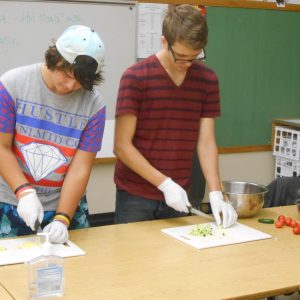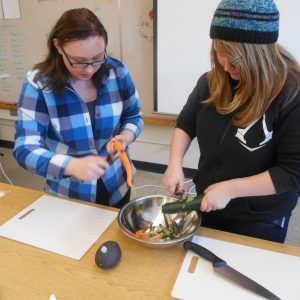It’s not just my favorite hashtag, it’s a way of life–ALWAYS LEARNING–and grateful to be doing so.
If you’ve been curious about the radio silence from station TCC since November of 2019, here’s the deal: I pressed pause on (most) “live” operations with The Curriculum of Cuisine. While I may have taken a break from turning classrooms into kitchens and chefs into teachers (#classroomsintokitchens, #chefsintoteachers–respectively) my learning and commitment to food justice and educational justice has continued.

As for so many of you, this past year-and-a-half has only more clearly magnified the inequities our current models of school are built on.
For me, there has never been a more opportune time to upend how we “do school.” (I mean, not so secretly, this is what TCC was endeavoring to do all along…)
Even though it’s nearly August, we do not need to go forward into this next school year abiding by many of the antiquated elements (most of which were devised to perpetuate race- and class-based social inequities,) that it seemed there was never a “right” time to pause. As we approach the 2020-2021 school year, we must do so with bold steps towards equity and creating schools that serve our students as whole children. To that end, in my opinion, there has never been a more ideal time to:
- Redesign the structure of the academic calendar. We are no longer an agrarian society. Let’s shift to year-round school for numerous reasons. For example, so students and families can opt out of a term at times that honor their cultural traditions and family needs. A year-round calendar also provides an opportunity for dedicated individual and group therapy to be built into the daily/weekly schedules of our trauma informed school sites. A year-round model gives administrators and teachers a framework to implement the kinds of learning (longer-term field trips, off-site school with for and non-profit partners, etc.) that we know students thrive from participating in, but that doesn’t look like “seats in desks” classroom learning and subsequently get curtailed by a “summers off” model.
- Reimagine the time-frames of the academic learning day. Over this past year we learned the pros/cons of online learning, both for teachers and students. Many learners have thrived in CDL. Can we loosen our grip on school being M-F 8am-3.30pm enough so that they can continue to rock it? While we’re at it, let us all have a deep think about the forces and systems that determined school “has to be” M-F 8am-3.30pm anyway. Let me know what you discover.
- Reprioiritize what we’re teaching and learning during our face-to-face time with students. For teachers and students, nothing can replace the brilliant and challenging intricacies (and idiosyncrasies) of building classroom communities. To me then, this is an ideal time to reprioritize what we are teaching during that precious shared time. Undoubtedly this entails more inclusive curriculum choices and teaching techniques that address various learning styles. I’m hoping we can push towards increased SEL and life skills for all students, as a part of every school day. Those are the subjects and lessons we need the company of one another to practice and learn. Moreover, these are also the skills all students need to master in order to create a lifetime of well-being and success.
Speaking of the importance of life skills (like cooking, financial literacy, and mindfulness) for all students, Lili Gurry at Be-Roll (a rad weekly newsletter curated to showcase the uplifting, human side of news) was sweet enough to interview me about how working to get students those skills has shaped my journey–past and future. Check it out!
Be in touch if I can support your work and pursuit of Good Trouble.


 BETWEEN
BETWEEN profit organization to feature each month for their “Register Round-Up” fundraising campaign. Now though, they are putting that decision in the hands of their their 12,000+ owners and YOU to vote for the organization awarded those funds!
profit organization to feature each month for their “Register Round-Up” fundraising campaign. Now though, they are putting that decision in the hands of their their 12,000+ owners and YOU to vote for the organization awarded those funds! So how does The Curriculum of Cuisine
So how does The Curriculum of Cuisine  (if you help up get enough votes to be selected)?
(if you help up get enough votes to be selected)?
 “Opportunities to develop cooking skills by adolescents may result in long-term benefits for nutritional well-being,” Utter said in a journal news release.
“Opportunities to develop cooking skills by adolescents may result in long-term benefits for nutritional well-being,” Utter said in a journal news release.
 It feels so apropos to be writing this on Valentine’s Day, because this post will provide all of the information you need to
It feels so apropos to be writing this on Valentine’s Day, because this post will provide all of the information you need to  work. Thus far, they have donated nearly $162,000! (That’s a lot of pints; good work folks!) On Monday, February 26, 2018, we will have the opportunity to be OPH’s Charity of the Day.
work. Thus far, they have donated nearly $162,000! (That’s a lot of pints; good work folks!) On Monday, February 26, 2018, we will have the opportunity to be OPH’s Charity of the Day.













 during that time-frame will be donated to TCC. Plus we’ll be hosting one heck-of-a silent auction with prizes from the likes of:
during that time-frame will be donated to TCC. Plus we’ll be hosting one heck-of-a silent auction with prizes from the likes of:  shin-dig at Rossi Farms.
shin-dig at Rossi Farms.
 Whatever you decide on for dinner, your meal will help us continue to turn high school classrooms into kitchens and chefs into teachers.
Whatever you decide on for dinner, your meal will help us continue to turn high school classrooms into kitchens and chefs into teachers.
 Many thanks to all of you who joined us at
Many thanks to all of you who joined us at 
 of the event receiving proceeds of the raffle.
of the event receiving proceeds of the raffle. so that can create a lifetime of wellness and success). THRIVE stand’s behind supporting their farmers and partner with local businesses (that’s TCC!)to create a sustainable community from which we can all– Thrive!
so that can create a lifetime of wellness and success). THRIVE stand’s behind supporting their farmers and partner with local businesses (that’s TCC!)to create a sustainable community from which we can all– Thrive!

